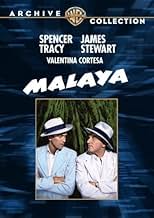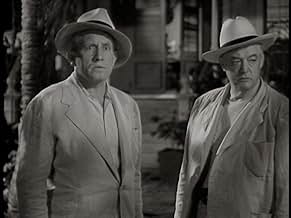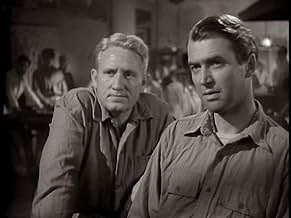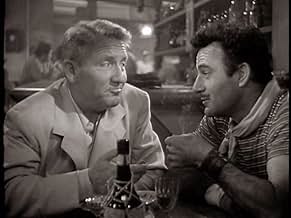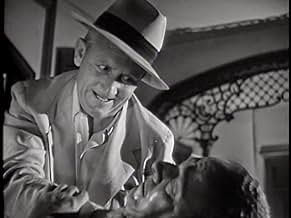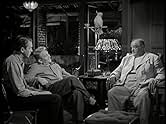AVALIAÇÃO DA IMDb
6,5/10
1,6 mil
SUA AVALIAÇÃO
Adicionar um enredo no seu idiomaNewspaperman Royer convinces government officials of a plan to obtain rubber by smuggling it out from under the Japanese. Carnahan is let out of prison to help.Newspaperman Royer convinces government officials of a plan to obtain rubber by smuggling it out from under the Japanese. Carnahan is let out of prison to help.Newspaperman Royer convinces government officials of a plan to obtain rubber by smuggling it out from under the Japanese. Carnahan is let out of prison to help.
- Direção
- Roteiristas
- Artistas
- Prêmios
- 2 vitórias no total
Valentina Cortese
- Luana
- (as Valentina Cortesa)
Lester Matthews
- Matisson
- (cenas deletadas)
Joel Allen
- Federal Agent
- (não creditado)
Besmark Auelua
- Henchman
- (não creditado)
George M. Carleton
- Small Businessman
- (não creditado)
Silan Chan
- Malay Girl
- (não creditado)
Spencer Chan
- Chinese Shipmaster
- (não creditado)
Joseph Crehan
- Businessman with Pipe
- (não creditado)
- Direção
- Roteiristas
- Elenco e equipe completos
- Produção, bilheteria e muito mais no IMDbPro
Avaliações em destaque
There is a scene that makes the whole picture worthwhile (although it is otherwise pretty ordinary):
Sydney GREENSTREET is entering a room after app. 2/3 of the movie, where Spencery Tracey has just been "treated kindly" in an "interview", Greenstreet is sweating (as always), sitting down and looking at the molestor of Tracy, then says (roughly): "If you say this was necessary, then of course it was necessary, but wasn't that much for a bottle of poor booze?". The officer say: "But he broke our rules". Greenstreet: "A man who drinks and then doesn't break any rules is no man. Drinking and making troubles goes together, this is also a rule." What a line !! Officer: "I love your logic." Of course these are not exactly the lines from the picture, cause I saw the German dubbed version and re-translated them, but they can only be better in the English version.
Hilarious! Tape it, when shown on TV next time and get to that scene, it is just great!
Sydney GREENSTREET is entering a room after app. 2/3 of the movie, where Spencery Tracey has just been "treated kindly" in an "interview", Greenstreet is sweating (as always), sitting down and looking at the molestor of Tracy, then says (roughly): "If you say this was necessary, then of course it was necessary, but wasn't that much for a bottle of poor booze?". The officer say: "But he broke our rules". Greenstreet: "A man who drinks and then doesn't break any rules is no man. Drinking and making troubles goes together, this is also a rule." What a line !! Officer: "I love your logic." Of course these are not exactly the lines from the picture, cause I saw the German dubbed version and re-translated them, but they can only be better in the English version.
Hilarious! Tape it, when shown on TV next time and get to that scene, it is just great!
Spencer Tracy and James Stewart preside over a terrific cast in "Malaya," a 1949 film also starring Valentina Cortese, Sydney Greenstreet, John Hodiak, Lionel Barrymore, Roland Winters and Gilbert Roland.
This is a fictional account of a very real situation involving the shortage of rubber during World War II. Japan really dominated the countries that had the rubber, and there was smuggling of rubber to the U.S. The situation involving Tracy and Stewart, however, never happened.
Tracy plays a con named Carnahan, whom the government releases from Alcatraz in order to spearhead this project, and Stewart plays John Royer, a former reporter with a shady enough past that the government (represented by John Hodiak) thinks he's a good bet to go into Malaya and smuggle tons of rubber out of that country and pay with gold. Carnahan knows the country like the back of his hand and has the connections. He and Royer pose as Irish sailors looking for work in order to get around a suspicious Colonel Tomura (Richard Loo) while they are helped by an old friend of Carnahan's, The Dutchman (Sydney Greenstreet). Cortese has the Dietrich role, that of a singer in love with Carnahan.
There are some exciting scenes in this film, and it holds one's attention. One of the best performances comes from Gilbert Roland, who leads the smugglers handpicked by The Dutchmen. He's very convincing.
As for Tracy and Stewart, well, although Tracy started out in tough guy Wallace Beery roles, 1949 was a little late for him to be taking them up again. Actually Hodiak would have been good, or Bogart, or John Wayne, Jimmy Cagney, someone along those lines. I thought Stewart was very good and that the two of them made an effective team. Someone said he came off as a nice guy. I thought he did cynic and hardboiled well. You can be cynical and hardboiled and averse to physical violence.
All in all, pretty good.
This is a fictional account of a very real situation involving the shortage of rubber during World War II. Japan really dominated the countries that had the rubber, and there was smuggling of rubber to the U.S. The situation involving Tracy and Stewart, however, never happened.
Tracy plays a con named Carnahan, whom the government releases from Alcatraz in order to spearhead this project, and Stewart plays John Royer, a former reporter with a shady enough past that the government (represented by John Hodiak) thinks he's a good bet to go into Malaya and smuggle tons of rubber out of that country and pay with gold. Carnahan knows the country like the back of his hand and has the connections. He and Royer pose as Irish sailors looking for work in order to get around a suspicious Colonel Tomura (Richard Loo) while they are helped by an old friend of Carnahan's, The Dutchman (Sydney Greenstreet). Cortese has the Dietrich role, that of a singer in love with Carnahan.
There are some exciting scenes in this film, and it holds one's attention. One of the best performances comes from Gilbert Roland, who leads the smugglers handpicked by The Dutchmen. He's very convincing.
As for Tracy and Stewart, well, although Tracy started out in tough guy Wallace Beery roles, 1949 was a little late for him to be taking them up again. Actually Hodiak would have been good, or Bogart, or John Wayne, Jimmy Cagney, someone along those lines. I thought Stewart was very good and that the two of them made an effective team. Someone said he came off as a nice guy. I thought he did cynic and hardboiled well. You can be cynical and hardboiled and averse to physical violence.
All in all, pretty good.
(Version reviewed is the 90-minute German-language showing on ARD on July 5, 2001.)
There are two rather unbecoming aspects about this movie, one being its blunt nationalism, the other one its odd casting. Where you would have expected, say, William Holden as the daring journalist and, well, Humphrey Bogart as the cynical hotshot, you get Jimmy and Spence. It's not that they don't act well, but the rôles just don't seem to fit. What a difference with handsome Mexican Gilbert Roland who is chosen perfectly (as Romano).
Journalist Royer (Stewart) gets his rival/friend Carnaghan (Tracy) out of prison with help from official sides (fine thesping by John Hodiak) for the good of the nation, that is, to haul all possible rubber out of British, but Jap-occupied, Malaya for the United States. Of course, the European land-owners give all assistance possible to support the sacred case, including a voluntary beating that Ian MacDonald gets from Tracy. America's raw nationalism was curiously carried right into the German translation: dubious Bruno Gruber (played by "Charlie Chan" Roland Winters) is named Marty Robber (or so) in German dubbing version of 1955, because a badman just couldn't have a German name to German audiences... This should be worth a correction, although the forgery effect is not as high as in the original 1952 dubbing of "Casablanca", that was corrected in a new version as late as in 1968. (Stewart, by the way, is synchronized well by Eckart Dux this time, not by regular Siegmar Schneider.)
Although film's humour is well-measured, it cannot conceal, but rather contributes to, the dare-devil chauvinism, four years after the war ended. Tracy played something of a contrary rôle in "Bad Day at Black Rock", as regards the U.S. relationship to the Japanese.
There's a lot of epigonism of "Casablanca", though not as much as in its immediate successors, in "Malaya". We have Richard Loo's Col. Tomura marching into the bar like Maj. Strasser; Italy's Cortese in the European female part (the story might have done without her, were there not some nice dialogues with Tracy); and the wonderful Sydney Greenstreet, who somewhat resumes his Senor Ferrari rôle (that parrot of his is a blue one, I suppose).
Despite this emulation, Frank Fenton's screenplay has something interesting about it that makes this movie agreeable after all. But it wouldn't have taken the famous leading players, close to miscasts, for something that appears like an MGM "B" production to me. - Worst thing is, I couldn't spot DeForest "Bones" Kelley anywhere around, although he is said to be there.
There are two rather unbecoming aspects about this movie, one being its blunt nationalism, the other one its odd casting. Where you would have expected, say, William Holden as the daring journalist and, well, Humphrey Bogart as the cynical hotshot, you get Jimmy and Spence. It's not that they don't act well, but the rôles just don't seem to fit. What a difference with handsome Mexican Gilbert Roland who is chosen perfectly (as Romano).
Journalist Royer (Stewart) gets his rival/friend Carnaghan (Tracy) out of prison with help from official sides (fine thesping by John Hodiak) for the good of the nation, that is, to haul all possible rubber out of British, but Jap-occupied, Malaya for the United States. Of course, the European land-owners give all assistance possible to support the sacred case, including a voluntary beating that Ian MacDonald gets from Tracy. America's raw nationalism was curiously carried right into the German translation: dubious Bruno Gruber (played by "Charlie Chan" Roland Winters) is named Marty Robber (or so) in German dubbing version of 1955, because a badman just couldn't have a German name to German audiences... This should be worth a correction, although the forgery effect is not as high as in the original 1952 dubbing of "Casablanca", that was corrected in a new version as late as in 1968. (Stewart, by the way, is synchronized well by Eckart Dux this time, not by regular Siegmar Schneider.)
Although film's humour is well-measured, it cannot conceal, but rather contributes to, the dare-devil chauvinism, four years after the war ended. Tracy played something of a contrary rôle in "Bad Day at Black Rock", as regards the U.S. relationship to the Japanese.
There's a lot of epigonism of "Casablanca", though not as much as in its immediate successors, in "Malaya". We have Richard Loo's Col. Tomura marching into the bar like Maj. Strasser; Italy's Cortese in the European female part (the story might have done without her, were there not some nice dialogues with Tracy); and the wonderful Sydney Greenstreet, who somewhat resumes his Senor Ferrari rôle (that parrot of his is a blue one, I suppose).
Despite this emulation, Frank Fenton's screenplay has something interesting about it that makes this movie agreeable after all. But it wouldn't have taken the famous leading players, close to miscasts, for something that appears like an MGM "B" production to me. - Worst thing is, I couldn't spot DeForest "Bones" Kelley anywhere around, although he is said to be there.
This film has some really great actors in it - Sydney Greenstreet, Spencer Tracey, Lionel Barrymore, James Stewart, Gilbert Roland, John Hodiak, Richard Loo, etc. And it's got an exotic location (Malaya) and a war-time plot (getting rubber to outfit the US war machine in WW2). But it never manages to get going, maybe because Spencer Tracey was never really an "action" star, or maybe because the director Richard Thorpe, while prolific, wasn't particularly skilled in this genre (he's best known for Ivanhoe, Knights of the Round Table, The Great Caruso, The Student Prince).
It's worth a look, and Barrymore and Greenstreet do their usual wonderful jobs.
It's worth a look, and Barrymore and Greenstreet do their usual wonderful jobs.
Malaya may seem a fantastic tale, but the story actually has quite a bit of truth to it. When World War II broke out the Japanese quickly conquered most of the rubber producing areas of the world. The modern mechanized army does run on rubber and both the USA and Germany developed types of synthetic rubber to be used.
My mother told me during World War II there were all kinds of drives for recyclable material and among the most valuable was rubber. People contributed all kinds of old tires for the war effort.
Lionel Barrymore plays the real life Manchester Boddy who was publisher of the Los Angeles Daily News who was the prime mover in the scheme you see portrayed here in Malaya. Though this story is fictional, the need for rubber in the USA was critical at the time and there was in fact a rubber smuggling operation going on.
Spencer Tracy before he came to MGM played just the kind of two fisted action heroes at Fox which was his original studio. He expressed an interest in doing this kind of film for old time sake and got cast in it. He really isn't poaching on Humphrey Bogart's territory these were the kind of roles he originally did in film while Bogey was playing hoods over at Warner Brothers.
Because the script called for a buddy team of heroes, James Stewart was approached and he even conceded top billing to Tracy. According to the Films of James Stewart, he admired Tracy as an actor so much that he was grateful just for the opportunity to work with him again. In fact Stewart's first film role was in Murder Man, a film that starred Spencer Tracy back in 1935.
With the two of these big stars in the leads, MGM was able to recruit a really outstanding group of players like John Hodiak, Valentina Cortese, Roland Winters, Richard Loo, the aforementioned Lionel Barrymore and my two favorites Gilbert Roland and Sydney Greenstreet.
Roland was shortchanged though. Watching Malaya I could tell his role as Tracy's adventurous friend was left on the cutting room floor. But even a little Gilbert Roland is always a pleasure to watch.
This was Sydney Greenstreet's last film and in it he essentially reprises the part of Ferrari in Casablanca. He's got the best lines in the film and his scenes with his cockatoo are classic. As he says, he's just a saloon keeper with an access to gossip. Which gets put to very good use.
Stewart the idealist, Tracy the cynical realist. Too bad they didn't work together more.
My mother told me during World War II there were all kinds of drives for recyclable material and among the most valuable was rubber. People contributed all kinds of old tires for the war effort.
Lionel Barrymore plays the real life Manchester Boddy who was publisher of the Los Angeles Daily News who was the prime mover in the scheme you see portrayed here in Malaya. Though this story is fictional, the need for rubber in the USA was critical at the time and there was in fact a rubber smuggling operation going on.
Spencer Tracy before he came to MGM played just the kind of two fisted action heroes at Fox which was his original studio. He expressed an interest in doing this kind of film for old time sake and got cast in it. He really isn't poaching on Humphrey Bogart's territory these were the kind of roles he originally did in film while Bogey was playing hoods over at Warner Brothers.
Because the script called for a buddy team of heroes, James Stewart was approached and he even conceded top billing to Tracy. According to the Films of James Stewart, he admired Tracy as an actor so much that he was grateful just for the opportunity to work with him again. In fact Stewart's first film role was in Murder Man, a film that starred Spencer Tracy back in 1935.
With the two of these big stars in the leads, MGM was able to recruit a really outstanding group of players like John Hodiak, Valentina Cortese, Roland Winters, Richard Loo, the aforementioned Lionel Barrymore and my two favorites Gilbert Roland and Sydney Greenstreet.
Roland was shortchanged though. Watching Malaya I could tell his role as Tracy's adventurous friend was left on the cutting room floor. But even a little Gilbert Roland is always a pleasure to watch.
This was Sydney Greenstreet's last film and in it he essentially reprises the part of Ferrari in Casablanca. He's got the best lines in the film and his scenes with his cockatoo are classic. As he says, he's just a saloon keeper with an access to gossip. Which gets put to very good use.
Stewart the idealist, Tracy the cynical realist. Too bad they didn't work together more.
Você sabia?
- CuriosidadesSydney Greenstreet's final film.
- Erros de gravaçãoOne scene features wild chimpanzees. Chimps are natives of Africa, not Malaya.
- Citações
John Royer: You have to remember, this guy's a German.
Carnaghan: Yeah, but he's a greedy man, and greed has a nationality all its own.
- ConexõesEdited from Fomos os Sacrificados (1945)
- Trilhas sonorasBlue Moon
(uncredited)
Written by Richard Rodgers and Lorenz Hart
Performed by Valentina Cortese (as 'Luana'), also whistled by James Stewart
Principais escolhas
Faça login para avaliar e ver a lista de recomendações personalizadas
- How long is Malaya?Fornecido pela Alexa
Detalhes
Bilheteria
- Orçamento
- US$ 2.396.000 (estimativa)
- Tempo de duração
- 1 h 38 min(98 min)
- Cor
- Proporção
- 1.37 : 1
Contribua para esta página
Sugerir uma alteração ou adicionar conteúdo ausente

